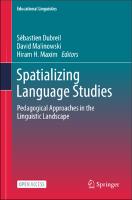Spatializing Language Studies
Pedagogical Approaches in the Linguistic Landscape
Contributor(s)
Dubreil, Sébastien (editor)
Malinowski, David (editor)
Maxim, Hiram H. (editor)
Language
EnglishAbstract
This open access volume offers valuable new perspectives on the question of how mobility, locatedness and immersion in the physical world can enhance second language teaching and learning. It does so through a diverse array of empirical studies of language, literacy, and culture learning in the linguistic landscape of visible and audible public discourse. Written from conceptually rich and disciplinarily varied perspectives, its ten chapters address methodological and practical problems of relating language learning to the lived and rapidly changing places of the late modern world. Whether it is within the four walls of a school, in a nearby multilingual neighborhood, in a virtual telecollaborative space, or in any other location where languages may be learned, this volume highlights different configurations of learning spaces, the leveraging of real-world places for critical learning, and ways to productively ‘dislocate’ language learners from preconceived notions and standardized experiences. Together, these elements create conditions for a language and literacy pedagogy that can be said to be robustly spatialized: linguistically and culturally complex, geographically situated, historically informed, dialogically realized, and socially engaged.


 Download
Download Web Shop
Web Shop